
Mrs. Miniver is a fictional character created by Jan Struther in 1937 for a series of newspaper columns for The Times, later adapted into a film of the same name.

William Wyler was a German-born American film director and producer. Known for his work in numerous genres over five decades, he received numerous awards and accolades, including three Academy Awards. He holds the record of twelve nominations for the Academy Award for Best Director. For his oeuvre of work, Wyler was awarded the Irving G. Thalberg Memorial Award, the Directors Guild of America Lifetime Achievement Award, and the American Film Institute Life Achievement Award.

Eileen Evelyn Greer Garson was a British-American actress and singer. She was a major star at Metro-Goldwyn-Mayer who became popular during the Second World War for her portrayal of strong women on the homefront; listed by the Motion Picture Herald as one of America's top-10 box office draws from 1942 to 1946.
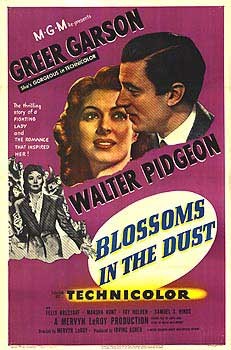
Blossoms in the Dust is a 1941 American biographical drama film directed by Mervyn LeRoy and starring Greer Garson, Walter Pidgeon, Felix Bressart, Marsha Hunt, Fay Holden and Samuel S. Hinds. It tells the story of Edna Gladney, who helped orphaned children find homes and began a campaign to remove the word "illegitimate" from Texas birth certificates, despite the opposition of "good" citizens. The screenplay was by Anita Loos, with a story by Ralph Wheelwright. Some of the important aspects of her life fictionalized in the film are the fact that it was Edna herself who was born out of wedlock; she and Sam eloped on the eve of her marriage to someone else, and they had much more time together before his death than given them in the film.
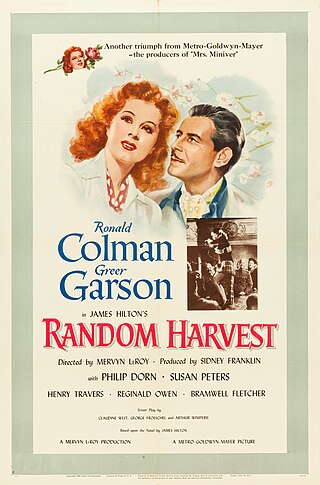
Random Harvest is a 1942 American romantic drama film based on the 1941 James Hilton novel of the same title, directed by Mervyn LeRoy. Claudine West, George Froeschel, and Arthur Wimperis adapted the novel for the screen, and received an Academy Award nomination. The novel keeps the true identity of Paula/Margaret a secret until the very end, something that would have been impossible in a film, where characters’ faces must be seen. This meant that the movie had to take a very different approach to the story. The film stars Ronald Colman as a shellshocked, amnesiac World War I veteran, and Greer Garson as his love interest.

Walter Davis Pidgeon was a Canadian-American actor. A major leading man during the Golden Age of Hollywood, known for his "portrayals of men who prove both sturdy and wise," Pidgeon earned two Academy Award nominations for Best Actor, for his roles in Mrs. Miniver (1942) and Madame Curie (1943).

Henry Wilcoxon was a British-American actor and film producer, born in the British West Indies. He was known as an actor in many of director Cecil B. DeMille's films, also serving as DeMille's associate producer on his later films.
The year of 1942 in film involved some significant events, in particular the release of a film consistently rated as one of the greatest of all time, Casablanca.

Mrs. Parkington is a 1944 drama film. It tells the story of a woman's life, told via flashbacks, from boarding house maid to society matron. The movie was adapted by Polly James and Robert Thoeren from the novel by Louis Bromfield. It was directed by Tay Garnett and starred Greer Garson and Walter Pidgeon appearing together as husband and wife for the fourth time.

Dame Mary Louise Webster,, known professionally as May Whitty and later, for her charity work, Dame May Whitty, was an English stage and film actress. She was one of the first two women entertainers to become a Dame. The British actors' union Equity was established in her home in 1930.
The 15th Academy Awards was held in the Cocoanut Grove at The Ambassador Hotel in Los Angeles on March 4, 1943, honoring the films of 1942. The ceremony is most famous for the speech by Greer Garson; accepting the award for Best Actress, Garson spoke for nearly six minutes, considered to be the longest Oscars acceptance speech. A portion of the ceremony was broadcast by CBS Radio.
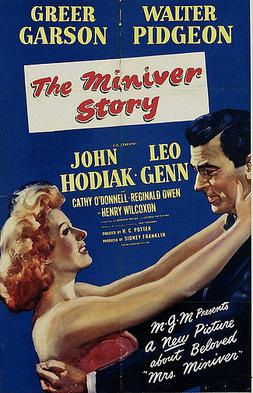
The Miniver Story is a 1950 American drama film that is the sequel to the 1942 film Mrs. Miniver. Like its predecessor, the picture, made by MGM, stars Greer Garson and Walter Pidgeon, but it was filmed on-location in England. The film was directed by H.C. Potter and produced by Sidney Franklin, from a screenplay by George Froeschel and Ronald Millar based on characters created by Jan Struther. The music score was by Miklós Rózsa and Herbert Stothart, with additional uncredited music by Daniele Amfitheatrof, and the cinematography by Joseph Ruttenberg.

Ilka Grüning was an Austrian-Hungarian actress. Born in Vienna in the old Austrian-Hungarian Empire, she was one of many Jewish actors and actresses that were forced to flee Europe when the Nazis came to power in 1933. A respected and famous actress of her time in the German-language area, she was forced to play bit parts in Hollywood.

Julia Misbehaves is a 1948 American romantic comedy film starring Greer Garson and Walter Pidgeon as a married couple who are separated by the man's snobbish family. They meet again many years later, when the daughter whom the man has raised, played by Elizabeth Taylor, invites her mother to her wedding. The film also features Peter Lawford and Cesar Romero.

Leonard Carey was an English character actor who very often played butlers in Hollywood films of the 1930s, 1940s and 1950s. He was also active in television during the 1950s. He is perhaps best known for his role as the beach hermit, Ben, in Alfred Hitchcock's Rebecca (1940).
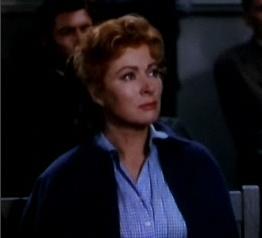
Scandal at Scourie is a 1953 American drama Technicolor film directed by Jean Negulesco, starring Greer Garson, Walter Pidgeon "above the title", and co-starring Donna Corcoran. Garson and Pidgeon were together for the 8th and last time in this movie, which was filmed on location in Canada.

Margaret "Talli" Tallichet was an American actress and longtime wife of movie director William Wyler. Her best-known leading role was with Peter Lorre in the film noir Stranger on the Third Floor (1940).

Harry Allen was an Australian-born American character actor of the silent and sound film eras. He was born in Melbourne, Victoria, Australia. Allen's World War One registration card gives his date of birth as 10 July, 1876 and confirms his place of birth as Melbourne, although at least one obituary gives the later birth year of 1883.
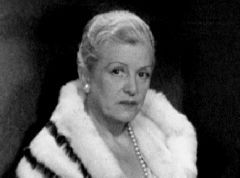
Florence Wix was an English-born American character actress who worked from the 1920s in silent films through sound films of the 1950s.
Ted Billings was an American character actor of the silent and sound film eras. Born in London, England on April 7, 1880, Billings made his film debut in the role of the Witch, in 1917's The Babes in the Woods, which starred Francis Carpenter and Virginia Lee Corbin as Hansel and Gretel. Over the course of his career he would appear in over 100 films, mostly in unnamed, un-credited roles.
















